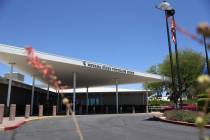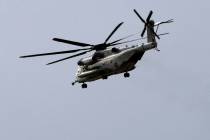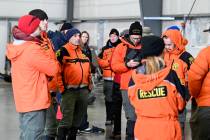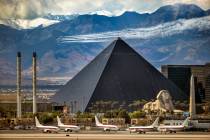Duty calls for Army reservists returning to Afghanistan


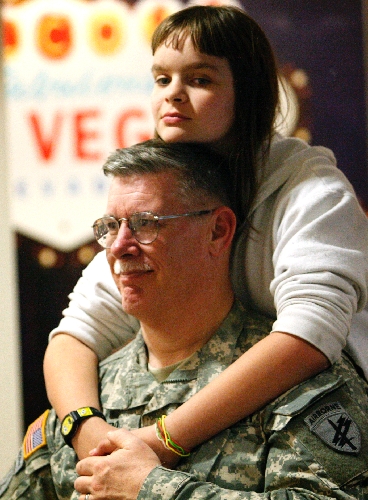
John Nichols is going back to Afghanistan. So is Randy Ford.
They’ve been there before — together. In 2006, a suicide car-bomber killed two of their comrades in a Taliban hot spot, Helmand province, where they were attached to a unit of British commandos.
They know what war is, and they know how important their job is as tens of thousands of U.S. troops come home this year and the decade-long war effort turns to nation-building.
For Nichols, a 41-year-old sergeant first class with the Army Reserve’s Vegas Desert Rats, this will be his fifth deployment to volatile parts of the world since 2004.
For Ford, a 54-year-old grandfather of six and the unit’s first sergeant, this will be his third trip overseas in the global war on terrorism.
When they arrive in Afghanistan in several weeks with about two dozen soldiers from Delta Company, 405th Civil Affairs Battalion, they will have served a total of eight times in eight years, all on volunteer assignments.
Why?
They want to finish the jobs they were trained for as infantry soldiers.
"They gave us all these skills we never got to use," said Nichols, a bald, bespectacled soldier with a trim, gray mustache.
In civilian life, he works for a Las Vegas armored truck company.
Nichols’ infantry training began in 1990. His four previous Army Reserve combat tours include 2004 in the Horn of Africa; 2006 in Afghanistan; 2007 in Iraq; and 2009 in Afghanistan.
Ford enlisted in the Army in 1974. He said this, his last tour, will be a mix of anticipation, concern and confidence, "knowing my men and women are well-trained."
As a civilian, he works for the Clark County Marshal’s Office. He previously worked as a deputy sheriff for Tulare County, Calif.
Ford and Nichols spoke about their commitment to serve as the 30 Vegas Desert Rats boarded a red-eye flight last week from McCarran International Airport on the first leg of their journey to a training base in New Jersey before eventually heading to Afghanistan.
This tour will focus on the U.S. military’s exit strategy: to win the hearts and minds of Afghans by providing security, stability and essential needs such as clean water and sanitation as the presence of U.S. troops dwindles after a decade of war.
"We’ll interact with the people," Nichols said. "We can’t kill all the enemy."
That means they’ll go into villages and population centers — "kinetic areas" — in four-man teams assisting special operations and infantry troops.
As Ford put it: "What we do is up close and personal, which puts us more at risk."
They’ll seek out leaders of Afghan communities, including some that are still intimidated by small groups of Taliban militants, or the "bogeymen," as Nichols calls them.
"It only takes one or two guys — a couple guys with guns — to hold the whole town," he said. "They’re hiding behind the trees sometimes. People are still afraid."
To win the confidence of what he calls the "power brokers," or village leaders, they’ll approach them, often with helmets off and their rifles slung behind their backs.
Nichols has prepared himself for exactly that moment so he can communicate with the locals. He has taken 200 hours of Farsi language courses, so when they approach a village, he’ll say, "Ney tars," which loosely translated means, "Don’t be afraid."
Because of the nature of his job, he’ll be packing an M-4 assault rifle, and will have a 9 mm pistol tucked away.
"I have been in I-don’t-know-how-many gunfights," he said.
But, he noted, "At the end of the day, we want them to decide who they want in their country. Our greatest goal is to work our way out of a job, to help them be an independent government."
Defense Secretary Leon Panetta has projected the military and international security forces would end their combat missions in 2013 as the withdrawal of U.S. troops leaves 68,000 in September, down from 99,000. In all, 22,000 troops are scheduled to return.
But 9,000 others like the Vegas Desert Rats will rotate in for the endgame. Some troops would remain in Afghanistan as trainers and advisers to the Afghan national forces.
The drawdown is "going to make things a little thinner," Nichols said. "We’ll have to find new ways of accomplishing the mission. Maybe there’ll be more foot patrols."
Ford’s 12-year-old granddaughter, Nikki, draped her arms over her grandpa’s shoulders as they waited in the airport. She had sensed the sadness of him leaving for a year at a send-off barbecue the day before.
"It’s kind of emotional for all of us," she said.
Patti, Ford’s wife of 34 years, had one thing on her mind.
"I just want him to come home safe," she said.
Contact reporter Keith Rogers at krogers@reviewjournal.com or 702-383-0308.












